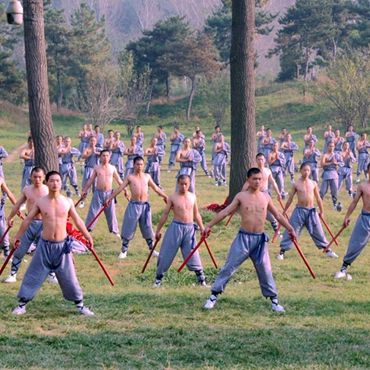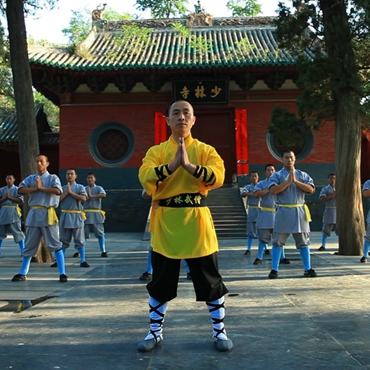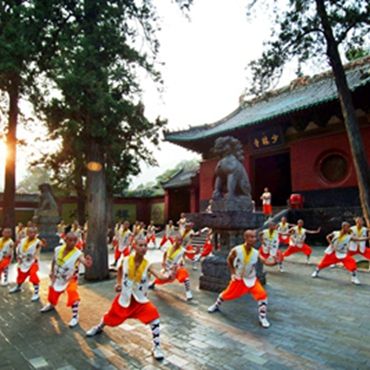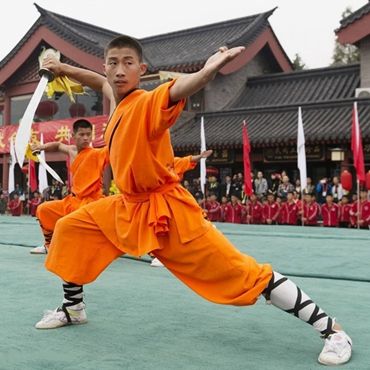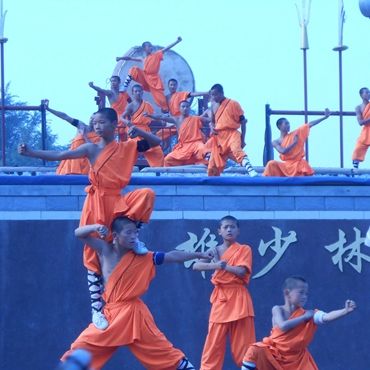Eating in Luoyang
Luoyang Food Briefing
Luoyang, a cradle of Chinese civilization and one of the nation’s ancient capitals, boasts a culinary heritage as profound as its 5,000-year history. Located in Henan Province, this city—once the eastern terminus of the Silk Road—melds Central Plains agricultural traditions with imperial grandeur and multicultural influences, creating a cuisine that is both hearty and historically resonant. At the heart of Luoyang’s food culture lies the iconic Luoyang Water Banquet, a Tang Dynasty-origin feast of 24 sequential soup-based dishes symbolizing life’s cyclical flow. Legend attributes its creation to Empress Wu Zetian, and its star dish, Peony Swallow Dish, features radish carved to mimic swallow nests, crowned with a peony-shaped egg garnish—a nod to Luoyang’s famed peony culture, later celebrated by Premier Zhou Enlai in 1973. Equally integral to daily life are Luoyang’s soul-warming soups, deeply rooted in the region’s arid climate and chilly winters. Locals savor steaming bowls of Beef Soup (slow-cooked with spices and paired with flatbread) or Pepper Pork Soup (a peppery donkey meat broth tracing back to Tang medicinal practices), often enjoyed at humble street stalls while perched on low stools—a testament to the city’s unpretentious charm. Street food thrives here, from golden Potstickers stuffed with pork to Jiang Noodles, fermented soybean broth noodles topped with pickled vegetables, and No-Turn Pancake Soup, a Qing Dynasty-era snack of herb-infused broth poured over delicate mung bean pancakes. Luoyang’s identity as the “City of Peonies” extends to its cuisine, with treats like Peony Cake—a sweet pastry blending red bean and edible petals—and peony-infused teas celebrating its floral emblem. The region’s culinary traditions mirror its historical tapestry: wheat-based staples like noodles and dumplings reflect Henan’s agrarian roots, while Buddhist influences from Luoyang’s White Horse Temple (China’s first Buddhist temple) inspire vegetarian adaptations. Meanwhile, Silk Road exchanges linger in the use of spices like cumin and sesame. To dine in Luoyang is to experience a living chronicle of emperors, traders, and everyday artisans, where each dish carries echoes of dynastic feasts, monastic simplicity, and cross-cultural exchange. As locals say, “A day without soup is a day unbalanced”—a philosophy inviting travelers to savor Luoyang’s legacy, one sip or bite at a time.
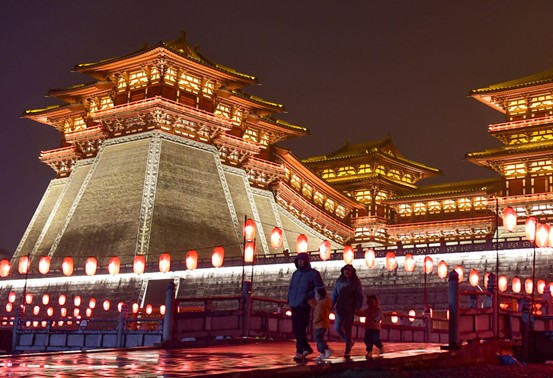
Famous Local Food
Luoyang Water Banquet (洛阳水席)
A culinary masterpiece dating back to the Tang Dynasty (618–907 AD), the Luoyang Water Banquet is a 24-course feast where every dish is served in a soup or broth, creating a fluid, harmonious dining experience. Its name derives from both the flowing sequence of dishes and the legend that Empress Wu Zetian, China’s only female emperor, praised its "endless flow like water." The banquet is divided into eight cold appetizers, sixteen warm dishes, and four "closing" soups. Standouts include Lianhua Tofu (lotus-shaped tofu stuffed with mushrooms) and Jinyu Mantou (golden-fried dumplings). The star, Peony Swallow Dish (牡丹燕菜), features finely shredded white radish resembling swallow nests, steamed in a delicate broth and crowned with a peony-shaped egg garnish. Premier Zhou Enlai named it during a 1973 state banquet, linking it to Luoyang’s peony culture. Historically, the banquet symbolized imperial grandeur but was later adapted for public celebrations, embodying Luoyang’s communal spirit.
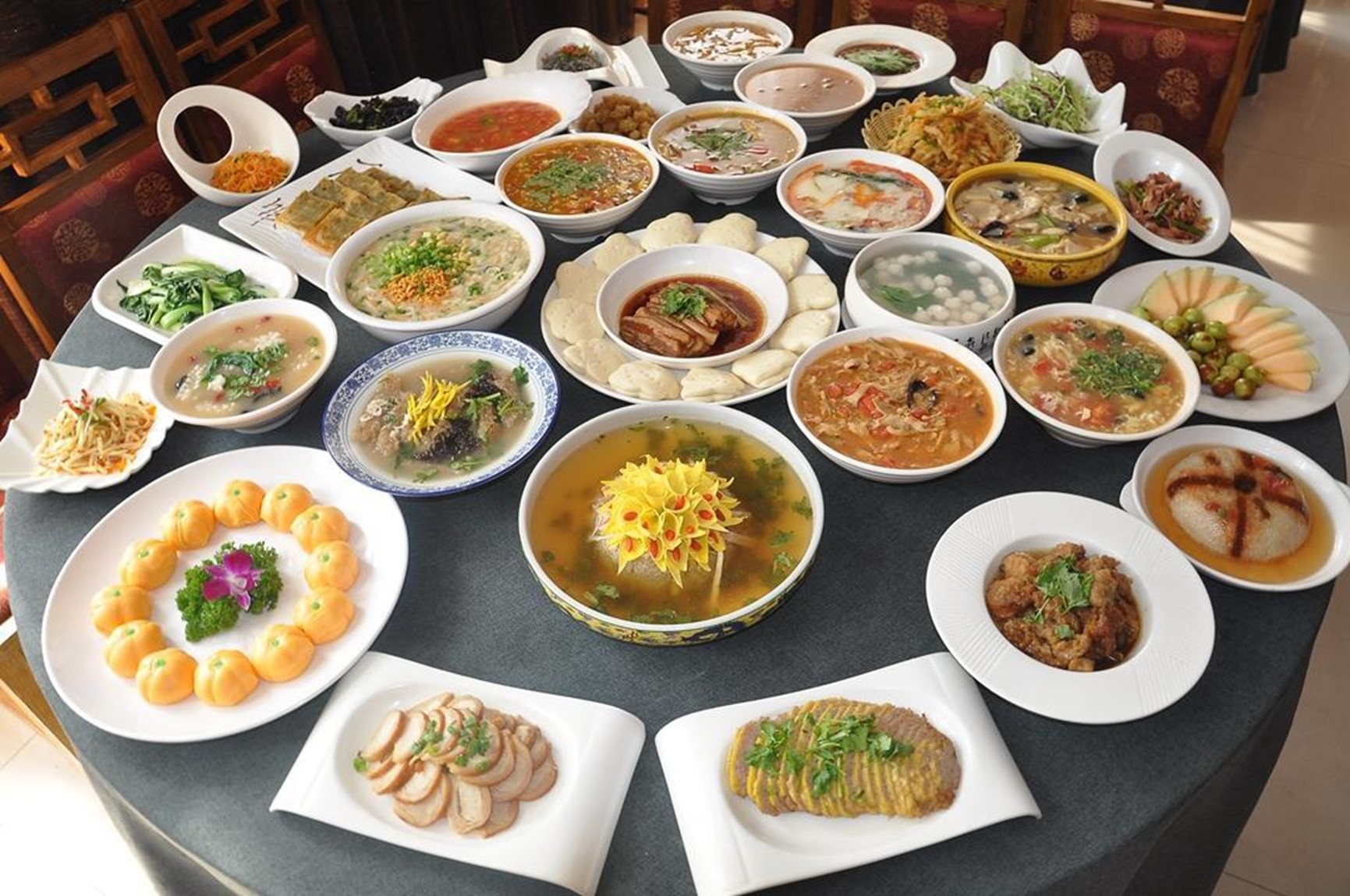
Luoyang Beef Soup (牛肉汤)
A breakfast staple since the Northern Wei Dynasty (386–534 AD), Luoyang Beef Soup reflects the city’s love for hearty, slow-cooked broths. Bone-in beef simmers overnight with ginger, star anise, and local herbs, creating a milky-white, collagen-rich broth. Served in rustic clay bowls, tender beef slices are topped with green onions, cilantro, and a splash of chili oil. Locals pair it with bing—a crusty, unleavened flatbread torn into chunks to soak up the soup. Unlike other regional beef soups, Luoyang’s version avoids soy sauce or heavy spices, emphasizing purity. Street vendors often offer free refills, a tradition rooted in the city’s agrarian past when laborers needed energy for long days. Recognized as a provincial intangible cultural heritage in 2016, this soup is a daily ritual uniting generations.
Luoyang Pepper Pork Soup (驴肉汤)
Donkey meat, a Tang Dynasty medicinal ingredient, takes center stage in this peppery, invigorating soup. Lean donkey meat is simmered for hours with white peppercorns, creating a clear, spicy broth believed to boost circulation and ward off colds. Thinly sliced meat is piled into bowls, garnished with coriander and vinegar-pickled garlic, and served with mo (a dense, steamed bread). Unique to Luoyang, this dish originated from Tang-era apothecaries who prescribed donkey meat for its high protein and low fat. Today, shops like Xiao Jie Donkey Meat Soup near the Old Town attract lines of locals by 6 a.m. The soup’s popularity peaks in winter, with some eateries selling over 500 bowls daily. Its robust flavor and health lore make it a must-try for adventurous foodies.
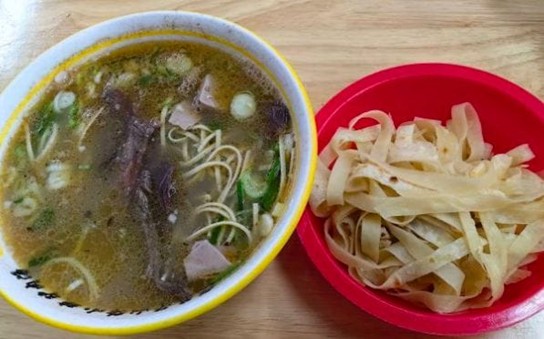
Potstickers (锅贴)
Luoyang’s take on potstickers combines crispy and tender textures. Crescent-shaped dumplings are stuffed with minced pork, chives, and ginger, pan-fried until golden, then steamed to lock in juices. Unlike northern Chinese versions, Luoyang’s filling is lighter, with a hint of Shaoxing wine for fragrance. The secret lies in the dough—hand-rolled to a precise thickness to avoid sogginess. Served with a black vinegar and chili dip, they’re a popular street snack. The Xigong Night Market boasts vendors who’ve perfected the craft for decades, their sizzling pans drawing crowds. Historically, potstickers were festival food, but today they symbolize Luoyang’s blend of simplicity and sophistication.
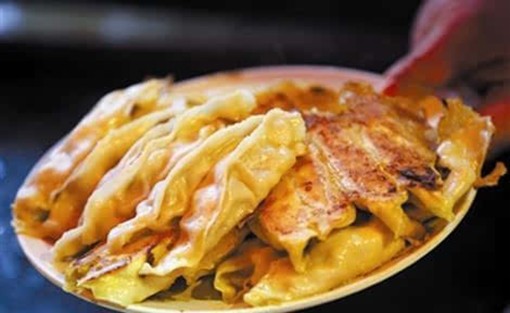
Jiang Noodles (浆面条)
A fermented delight, Jiang Noodles showcase Luoyang’s frugal ingenuity. The broth is made from jiang—a sour, creamy liquid leftover from fermenting mung bean starch. Noodles are boiled in this tangy base, then topped with pickled mustard greens, soybeans, and sesame sauce. Crushed peanuts and chili oil add crunch and heat. Originating from the Qing Dynasty (1644–1912), the dish was created by thrifty cooks repurposing kitchen scraps. Its acquired taste divides outsiders, but locals swear by its digestive benefits. The best versions are found in family-run shops like Laocheng Jiangmian Guan, where the jiang ferments naturally for 3–5 days. UNESCO listed it in 2023 as part of Henan’s intangible food heritage, praising its sustainable roots.
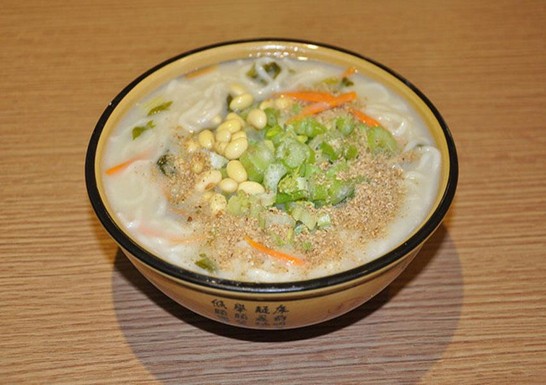
No-Turn Pancake Soup (不翻汤)
Named after its paper-thin mung bean pancake that “never flips” during cooking, this Qing Dynasty-era soup is a marvel of texture. The pancake, cooked on a griddle without flipping, is layered in a bowl and drenched in a herbal broth made with bone stock, wood ear mushrooms, and dried shrimp. Topped with chives and chili, it’s light yet satisfying. Folklore claims it was invented by a resourceful cook for hungry scholars en route to imperial exams. Today, Liu’s No-Turn Soup near Luoyang’s Old Town keeps the tradition alive, using a 200-year-old recipe. The dish symbolizes resilience—a humble ingredient transformed into comfort.
Peony Cake (牡丹饼)
Luoyang, the “City of Peonies,” turns its national flower into edible art. Peony Cake is a flaky pastry filled with red bean paste mixed with candied peony petals, harvested during April’s Peony Festival. The petals are soaked in honey to mellow their bitterness, then folded into the filling for a floral aroma. Baked until golden, the cakes are stamped with peony patterns. Originally a royal Tang Dynasty dessert, they’re now a popular souvenir. Workshops like Luoyang Peony Cake House offer tastings, pairing cakes with peony-infused black tea. In 2021, the recipe was patented as a protected regional specialty.
Sour and Spicy Tofu Soup (酸辣豆腐汤)
A vegetarian favorite, this soup balances tangy rice vinegar and numbing Sichuan pepper. Silken tofu cubes float in a broth thickened with wood ear mushrooms and bamboo shoots, while crispy fried dough sticks (youtiao) add contrast. Legend claims it was invented by a Song Dynasty chef to please a Buddhist abbot visiting the White Horse Temple. Today, temple visitors still enjoy it at nearby eateries like Tianxiang Vegetarian Kitchen. Its refreshing yet fiery profile makes it a summer staple, believed to cool the body. The dish embodies Luoyang’s Buddhist heritage and its knack for bold flavors.
Famous Food Areas
Old Town Night Market (老城十字街夜市)
Nestled in Luoyang’s historic quarter, the Old Town Night Market is a bustling labyrinth of food stalls that lights up after sunset, offering an intoxicating blend of aromas, sizzles, and chatter. Centered around the iconic Cross Street (十字街), this 1,200-year-old market traces its roots to the Tang Dynasty, when it served as a hub for Silk Road merchants. Today, it’s a democratic feast where locals and tourists jostle for space under red lanterns strung between Ming-era brick buildings. The star here is No-Turn Pancake Soup, served at family-run stalls like Liu’s No-Turn Soup, where third-generation cooks ladle herbal broth over paper-thin mung bean pancakes. Nearby, vendors dish out golden Potstickers with pork-and-chive fillings, their crispy bottoms crackling underfoot as crowds pass. Don’t miss the Peony Cake stands, where flaky pastries stamped with floral designs are baked fresh hourly. Adventurous eaters can try scorpion skewers—a daring street snack popularized in recent years—or sip Luoyang Yogurt, a mildly fermented drink served in clay jars. The market’s charm lies in its unscripted chaos: elderly noodle masters hand-pulling biangbiang noodles beside TikTokers livestreaming their meals. Open until midnight, it’s a living museum of Luoyang’s culinary evolution, where Tang Dynasty recipes coexist with modern food trends. Recognized by CCTV as “China’s Most Atmospheric Night Market” in 2022, it draws over 10,000 nightly visitors during the April Peony Festival.
Xigong Food Street (西工小吃街)
A 10-minute walk from the grand Wangcheng Park, Xigong Food Street is where Luoyang’s working class has fueled up since the 1950s. Unlike the touristy Old Town, this 500-meter strip remains fiercely local, its neon-lit stalls specializing in breakfast classics and late-night comfort foods. Mornings belong to Luoyang Beef Soup—head to Yang’s Beef Soup, a 70-year-old institution where regulars squat on plastic stools, tearing bing into bowls of milky broth. By midday, the street shifts to Jiang Noodles, with shops like Laocheng Jiangmian Guan fermenting their sour soybean broth in clay pots visible behind glass counters. The real magic happens after dark, when Xigong Barbecue stalls emerge, grilling cumin-dusted lamb skewers over charcoal and serving them with garlicky cold noodles. A hidden gem is Auntie Zhang’s Dumpling House, tucked into an alley, where jiaozi are stuffed with wild herbs foraged from Mount Mangshan. What sets Xigong apart is its unvarnished authenticity: menus are handwritten in Henan dialect, prices are unapologetically low (most dishes under ¥15), and the air hums with the clatter of mahjong tiles from nearby teahouses. In 2023, the street was revamped with retro signage and seating areas, but its soul remains intact—a tribute to Luoyang’s enduring love for hearty, no-frills fare.
Chanhe Hui Muslim Quarter (瀍河回族区)
Luoyang’s largest Muslim enclave, the Chanhe Hui Quarter, is a savory crossroads of Islamic and Central Plains flavors. Established during the Yuan Dynasty (1271–1368) by Silk Road traders, its winding alleys are dotted with blue-tiled mosques and halal eateries. The area is famed for Luoyang Pepper Pork Soup, best sampled at Ma Jie Donkey Meat Soup, a 150-year-old shop where diners queue at dawn for peppery broth poured over tender donkey slices. Nearby, Wang’s Lamb Steam Buns serves fluffy buns stuffed with cumin-spiced minced lamb, a recipe guarded since the Qing Dynasty. For sweets, Hui Style Honey Cake stalls offer rose-infused pastries drizzled with local acacia honey. The quarter’s pièce de résistance is its Night of Noodles—every Friday, families set up tables outdoors, feasting on hand-pulled lamian served with chili-black bean sauce. Unlike generic “Muslim streets” elsewhere in China, Chanhe retains its spiritual core: butchers recite prayers before slaughtering livestock, and bakeries close during Ramadan. A 2021 government initiative added bilingual signage and a food museum explaining Hui culinary traditions, making it accessible to foreign visitors. Don’t leave without trying Eight Treasures Tea at Old Ma’s Teahouse—a fragrant blend of chrysanthemum, dates, and walnuts served in brass pots.
Luoyang Lijing Gate Food Plaza (丽景门美食广场)
Flanking the magnificent Lijing Gate—a reconstructed Tang Dynasty fortress gate—this open-air plaza merges gourmet dining with imperial ambiance. Enter through the 30-meter-high stone archway, and you’ll find yourself in a gastronomic theme park where food stalls mimic ancient market booths, complete with calligraphy banners and waitstaff in Hanfu robes. The plaza’s showstopper is the Royal Water Banquet Experience, a condensed 12-course version of the traditional feast served in replica Tang porcelain. For quick bites, Empress Wu’s Noodle House crafts Peony Swallow Dish into a handheld wrap, while Silk Road Spice Alley offers camel meat skewers and pomegranate juice, evoking Luoyang’s trading past. At dusk, the plaza transforms: performers reenact Tang poetry readings, and floating lanterns illuminate the moat. While slightly pricier than street markets (dishes average ¥30–50), it’s a hit with foreign tourists for its English menus and cooking workshops. In 2023, it partnered with the Luoyang Culinary School to launch “Dine Like a Tang Noble” tours, pairing dishes with historical anecdotes. Critics call it theatrical, but its meticulous recreation of Tang Dynasty food culture—down to saffron-infused grape wine served in bronze cups—makes it a delicious history lesson.
Recommended Restaurants
Location: Jiudu Road, Luoyang
Tel: 0379-63580556
Representative Dishes: Donkey Soup
Baiwan Yangtang
Location: 3rd floor, New Duhui Square, Luoyang
Tel: 0379-62257058
Representative Dishes: Lamb Soup
Wufu Imperial Garden
Location: No. 445, Middle Zhongzhou Road, Luoyang
Tel: 0379-63935388
Representative Dishes: Roast Duck
Shanghai Wonton Restaurant
Location: 1st floor, No. 19, West Tanggong Road, Luoyang
Tel: 0379-3910112
Representative Dishes: Woton
Yaxiang Lou
Location: No. 4, Anhui Road, Luoyang
Tel: 0379-64921555
Representative Dishes: Zhengjiang Cuisine and Jiangsu Cuisine
Zhenbutong Restaurant (Water Banquet Specialty Branch)
Location: No. 369, Middle Zhongzhou Road, Laocheng District
Tel: 0379-63952309
Representative Dishes: Luoyang Water Banquet (Peony Swallow Dish, Sliced Pork in Broth)
Lao Luoyang Noodle House (Wangcheng Avenue Branch)
Location: Intersection of Wangcheng Avenue and Kaixuan Road, Xigong District
Tel: 0379-63287515
Representative Dishes: Jiang Noodles (Fermented Soybean Noodles), Fried Savory Pancakes
Xiao Jie Potstickers (Xigong Xiaojie Flagship Store)
Location: Xiaojie Alley, Renmin East Road, Xigong District
Tel: 0379-63952307
Representative Dishes: Beef Potstickers, Xiao Jie Tianfu Tripe Salad
Liu’s No-Turn Soup
Location: No. 1, West Street, Lijing Gate, Laocheng District
Tel: 0379-63551789
Representative Dishes: No-Turn Pancake Soup, Mung Bean Pancakes
Luoyang Tianfu Hotpot (Wanda Plaza Branch)
Location: 4th Floor, Wanda Plaza, Kaiyuan Avenue, Luolong District
Tel: 0379-65929966
Representative Dishes: Sichuan-Style Beef Oil Hotpot, Handmade Shrimp Paste
Nanguan Small Bowl Beef Soup (Flagship Store)
Location: Intersection of Jiudu Road and Fenghua Street, Laocheng District
Tel: 0379-63669776
Representative Dishes: Beef Soup, Crispy Oil-Spiral Bread
Laocheng Cross Street Night Market (Official Stalls)
Location: Xinghua Street Night Market, Laocheng District
Tel: No fixed phone (Official management contact: 0379-63551234)
Representative Dishes: Grilled Squid, Stir-Fried Liangfen (Mung Bean Jelly), Almond Tea
Luoyang Restaurant (Peony Banquet Hall)
Location: Middle Section of Yan’an Road, Jianxi District
Tel: 0379-64918888
Representative Dishes: Peony Pastry, Peony Silver Thread Soup
Lao Luoyang Wonton House
Location: Intersection of Tanggong West Road and Jiefang Road, Xigong District
Tel: 0379-63285678
Representative Dishes: Chicken Broth Wonton, Sesame Flatbread
Xiao Qin Chuan Shaanxi Cuisine
Location: Intersection of Guanlin Road and Houzaimen Street, Luolong District
Tel: 0379-65931117
Representative Dis
hes: Youpo Noodles (Spicy Oil Noodles), Roujiamo (Chinese Burger)
Brunei Restaurant
Location: No. 21, Xiyuan Road, Luoyang
Tel: 0379-4913855
Green Island Restaurant
Location: Commercial Street, Pearl River Road, Luoyang
Tel: 0379-64612668
Maple Leaf Toronto
Location: 1st floor, Shentai Mansion, Nanchang Road, Luoyang
Tel: 0379-64613898
Seascape Restaurant
Location: 2nd floor, Building 1, Tongyuan Garden, West Kaixuan Road, Luoyang
Tel: 0379-83329133

